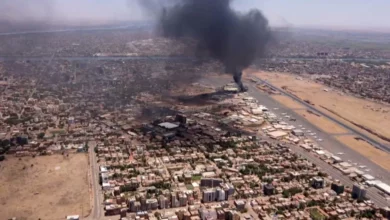JUBA, South Sudan – A Southern Sudanese official on Monday accused northern Sudan of declaring "economic war" by issuing a new currency just weeks after the south's independence, a move that could leave the struggling new government with coffers full of useless currency.
On Sunday, the Khartoum-based northern government debuted its new currency. South Sudan began using its own currency nearly a week ago, following its 9 July independence. Both the new and old currencies are called pounds.
Pagan Amum, secretary-general of the south's ruling Sudan People's Liberation Movement, said the Khartoum government violated an agreement to not introduce a new currency until six months after the south did.
He said the move would cost the southern government at least US$700 million – an added challenge as the undeveloped new country begins delivering basic needs such as education, health services, water and electricity to its more than eight million citizens.
South Sudan is rich in oil but is one of the world's poorest and least-developed countries. Its economy was devastated during a two-decade civil war with the north.
"The government of Sudan has literally declared and engaged in economic war against the newborn Republic of South Sudan," he said. "This is a hostile act. This is contrary and against all our aspirations and expectations that we were going to emerge as two independent countries…that are good neighbors cooperating in all fields."
He said many South Sudanese are still holding old Sudanese pounds, and that the northern government has declared those illegal tender.
"The implications of the introduction of a new currency is that the (old) Sudanese pounds are being made into an illegal tender with the Bank of Sudan not assuming responsibility for this currency which they have issued," he said.
Rabie A. Atti, a spokesman of Sudan's ruling National Congress Party, denied the north had declared "economic war" on the south. He said adoption of the new northern currency will be gradual and so the people of South Sudan have a chance to change the old currency.
"Our banks now are dealing with the same, the new currency and old currency," Atti said. "I don't think this is a big problem…I think it can be resolved technically without trouble for the north or the south."
He said the north has shown it is committed to peace by first signing a peace agreement in 2005 that ended two decades of war between the north and south.
He said Sudan also recognized the referendum in January this year – in which the south chose to secede – and declared that it was ready to cooperate and collaborate with South Sudan when it became independent this month.
"A weak country in the south will definitely also negatively reflect on the north," Atti said in a telephone interview.
The black African tribes of South Sudan and the mainly Arab north battled two civil wars over more than five decades, and some two million died in the latest war, from 1983-2005.
But the two countries still have not resolved several major issues. Weeks before the south's independence day, talks broke down over the disputed north-south border, management of the oil sector, and other critical issues that will shape future relations between the two nations.




